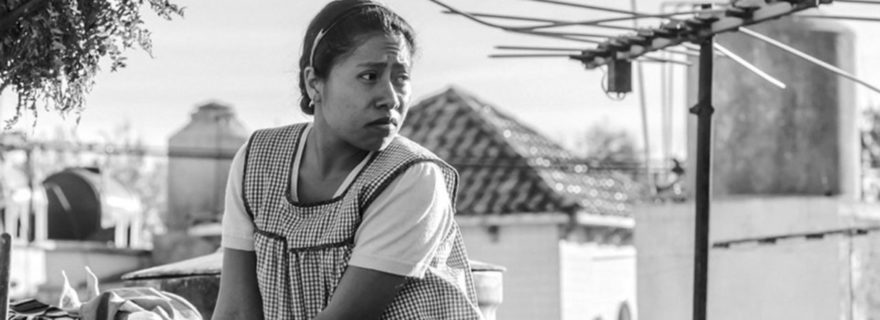Roma
Movie Rating:
5
After 17 years, Alfonso Cuarón finally made a follow-up to Y tu mamá también. During his time in Hollywood, Cuarón had a more personal and distinctly Mexican project planned that he was determined make. It took a few hundred million dollars worth of box office, a Best Director Oscar, and the invention of Netflix for that film to exist, but Roma is finally here and it’s a stunning and unforgettable masterpiece worth the wait.
The film follows a housekeeper named Cleo (Yalitza Aparicio) who works in an upper middle class home in 1970s Mexico City. She’s treated as a member of the family, but always with a certain distance. A firm class divide hovers over the home that is at times outright stated through ignorance. The other major character is the mother of the household, Sofía (Marina de Tavira), who is caring towards Cleo, but just as often dismissive and even cruel. Cuarón’s roving cameras follow Cleo throughout a year of her life. At first, the observations and scenes are mundane, but over time they grow in scale, meaning, and impact in ways that are almost indescribably powerful without ever breaking the fragile bubble of naturalism that Cuarón maintains.
While Cuarón works extraordinarily well with his cast (especially the heart-wrenching performance by debuting actress Aparicio and the amusingly clueless and complex work from de Tavira) to create stark and evocatively realistic world, this is one of the most stunningly stylized films in years. Using all of the virtuosic technical tricks he learned in blockbuster land, Cuarón crafts remarkable images that sear into the brain. Operating as his own cinematographer, he shoots entirely in stunning long takes and, despite eschewing any traditional score, creates an enveloping soundscape that bounces around theaters to pull viewers into the world. It’s not just directorial dick-wagging, either. Quite the contrary, it all comes with purpose. Much like Y tu mamá también and Children of Men, there are almost always two stories being told: Cleo’s story in the foreground and a second story in the gorgeously composed deep focus background. Sometimes that second story is as simple as an interaction between the children of the household. Sometimes it’s as complex as a massive riot. Regardless, the two stories always mingle and combine and contrast with each other to signify something more. It’s a fascinating technique that can be quite poignant. The filmmakers wrings it for so much meaning and emotion that Roma practically begs for multiple viewings.
Alfonso Cuarón has described his latest film as intensely personal, and that’s all too easy to see. He’s working from memory, but more importantly showing moments that created an awaking within him, whether it be an understanding of class and race through his family’s peculiarly loving relationship with Cleo or the grander political awakenings that are more literally embodied. It’s a film about so much, ultimately focused on a very specific, female, and racial perspective rarely shown. So much humanity and empathy are on display. The film is at times joyous, at times infuriating, and by the end absolutely devastating in its emotional impact. It’s hard to precisely describe Cuarón’s accomplishment in words because it’s so distinctly cinematic. You can only experience it in the moment and be overwhelmed by all the visual, aural, and human effects. The experience is incredibly rich, true, and potent if you give yourself over to it.
In fact, while it’s unlikely that any studio other than Netflix would finance such a project and allow Cuarón such control, it is a shame that the film will live forever on the streaming service. Roma benefits so much from a theatrical presentation, where the visuals and audio overwhelm and transport. Still, the payoff is worth it.
I’m not typically one to throw around the term masterpiece lightly, but after only a single sleep-deprived film festival viewing, I feel that it applies and I can’t wait to experience this stunning and singular film again to discover even more layers and wrinkles. You’ll be hearing a lot about Roma this year. The hype is deserved. Run to the cinema if you get a chance to see it projected, but no matter what give yourself over to Roma in any format to see what a special gift Alfonso Cuarón has delivered viewers with his post-Gravity gift of absolute filmmaking freedom. There will never be another movie quite like this.






Julian
Hey Phil, when you write ‘(…) There are almost always two stories being told (…) Regardless, the two stories always mingle’, it reminded me of the excellent ‘Una Giornata Particolare’ (1977). Is the comparison apt, or are the two movies nothing alike?
Phil
Hey Julien! Unfortunately I haven’t seen that film, so I can’t make the comparison. But you might be on to something! I’ll have to check it out.
Phil
Sigh…juliAn…apologies. Lousy predictive text got me again!
EM
That unpredictable predictive text!
Julian
No worries, Phil. Give us a holler once/when you’ve seen ‘Una Giornata Particolare’.